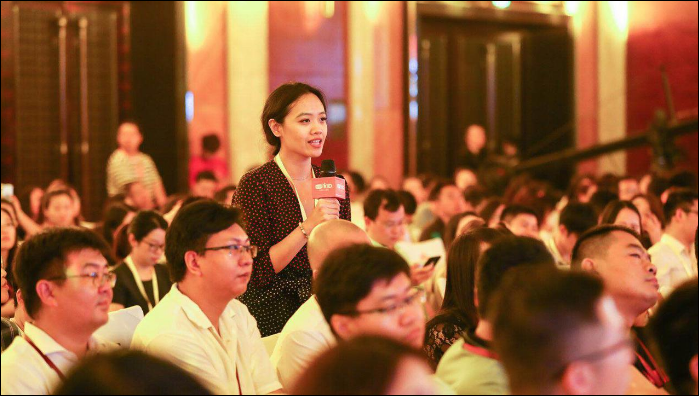
CGTN's reporter Wang Xiaozhou raises a question at the press conference in Beijing, China. (Photo: VIPKID)
In terms of technology adoption, education has remained at an early stage compared to other sectors such as e-commerce and new retail. But now, companies are trying to implement artificial intelligence (AI) to improve the quality and effectiveness of learning.
Microsoft recently signed a partnership with VIPKID concerning their products and technology development. "The application of AI is relatively low in the education sector. It only took 17 percent in 2017, far lower compared with the e-commerce and logistics sectors. The data is not that clear and logical to be collected than in e-commerce," said Zhang Yanjing, VP of Technology for VIPKID.
Zhang Zijian, Association Professor for School of Computer Science and Technology at Beijing Institute of Technology, said that “traditional education is usually one teacher with 30-40 students, which makes it impossible to take care of every student's different features.”
Therefore, from Zhang Zijian’s perspective, AI education can be smarter in the future and be personalized to each student based on their own personality and cognition level.
As one of the early AI pioneers, Microsoft has teamed up with HP and its Dynamics 365 AI solution system to transform customer support experiences.
Now, it will help VIPKID in analyse student behavior and teacher's teaching quality. And Zhang Qi, Senior Deputy Head of Microsoft Search Technology Center (STC) Asia, told CGTN that VIPKID is actually doing well in terms of collecting and analyzing data.
According to Zhang Yanjing, VIPKID has collected tens of millions of hours of students' speaking samples, training their AI model to understand facial expressions.
"Interactivity and involvement are crucial in online education. We developed a complicated algorithm to analyze students' eyes and how they move. And we train the model through deep learning. Each student has different ways to express feelings, so the feedback could be very different." Zhang Yanjing explained.
As AI is more and more involved in education, how can human beings make sure what we are taught is what we want to learn? Experts don't seem to worry that much. They believe that the first principle of AI is to augment people's abilities rather than replace humans.
“I'd rather consider AI as a challenge, not a threat to humans. I would see it as a part of evolution. If we could get better off with it, why not to learn from them,” Zhang Zijian shared with CGTN. Meanwhile, Zhang Qi is positive on AI’s potential as it can “set people free to do more creative work.”


